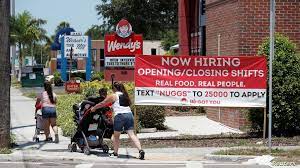US Jobless Benefit Claims Drop for 5th Straight Week

New claims for jobless benefits in the United States dropped last week for the fifth straight week, the Labor Department reported Thursday, as the world’s biggest economy continues its marked recovery from the coronavirus pandemic.
A total of 385,000 out-of-work employees filed for unemployment compensation, down 20,000 from the revised figure of the week before, the agency said. The figure was the lowest total since mid-March 2020 when the pandemic first swept into the country and marked the first time the weekly total had dropped below 400,000 in more than a year.
Nearly 52% of U.S. adults have now been fully vaccinated against the coronavirus, boosting the economic recovery, although the pace of inoculations has dropped from its peak a few weeks ago. Officials in many states are now offering a variety of incentives to get people inoculated, including entry into lucrative lotteries.
The continuing drop in the number of jobless benefit claims could presage more hiring. Analysts are awaiting the May hiring report, set for release on Friday. U.S. employers added only 266,000 more jobs in April, down from the robust 916,000 figure in March. Nearly 10 million people remain officially unemployed in the U.S.
With the steady recovery, many employers are reporting a shortage of workers, particularly for low-wage jobs such as restaurant servers and retail clerks. Many businesses complain they are unable to find enough applicants for the job openings, even though the jobless rate remains at 6.1%, much higher than the 3.5% rate in March of last year before the pandemic was declared.
The federal government approved sending $300-a-week supplemental unemployment benefits to jobless workers through early September on top of less generous state-by-state payments.
But at least 25 of the 50 states, all led by Republican governors, are now ending participation in the federal payments as soon as next week, contending that the stipends let workers make more money than they would by returning to work and thus are hurting the recovery by not filling available job openings.
Some economists say, however, other factors prevent people from returning to work, such as lack of childcare or fear of contracting the coronavirus.
The U.S. government has determined that it has no authority to force the states to continue to make the payments into September. President Joe Biden recently reaffirmed rules for accepting the extra federal aid so unemployed workers could not game the system.
“We’re going to make it clear that anyone collecting unemployment who is offered a suitable job must take the job or lose their unemployment benefits,” Biden said. “That’s the law.”
The economic picture in the U.S. has been boosted as money from Biden’s $1.9 trillion coronavirus relief package filters through the economy. The measure has likely boosted consumer spending, as millions of Americans, all but the highest wage earners, are now receiving $1,400 stimulus checks from the government or have already been sent the extra cash.
Biden is proposing an additional $4 trillion in government spending on infrastructure repairs and assistance for children and families, but the assistance has been met with stiff resistance from Republicans. The fate of the proposals in the politically divided Congress remains uncertain.
Numerous Republican lawmakers have voiced opposition to the size of the Democratic president’s spending plans and his proposals to pay for them with higher taxes on corporations and the wealthiest Americans.
Absent an agreement with Republicans, Democratic congressional leaders say they could attempt to push through Biden’s proposals solely with Democratic votes without any Republican support, as occurred with passage of the coronavirus relief package.
Read from source

















